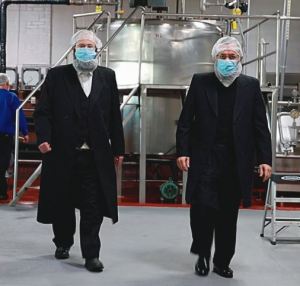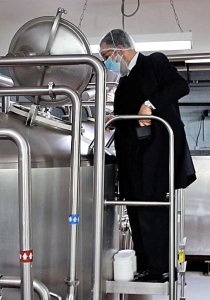Hanan Products goes into 30th year of Passover prep
Passover is a major Jewish holiday celebrated in the spring that marks the Exodus of the Children of Israel from Egyptian slavery. A central tenet of Passover is the biblical prohibition of owning leavened foods for the duration of this high holiday. Leaven, referred to as chametz in Hebrew, is made from one of five types of grains combined with water that’s left to stand for more than 18 minutes.

(Photo by Brian Chykirda)
The importance of removing any traces of chametz is so crucial that Hanan Products, a Hicksville-based manufacturer of wholesale dairy and non-dairy whipped toppings, icings, and fillings for commercial and supermarket bakeries, pivots to meet the needs of the kosher community every January. This kosherization process, which the company has been conducting for the past 30 years, involves Hanan putting 100 percent of its production output into a pair of products that are kosher for Passover—a non-dairy coffee whitener and one non-dairy whipped topping.
Debby Wilder, Hanan’s kosher coordinator who started shortly after the process was implemented, explained the reason for the enormous lead-time needed to prep for a holiday that’s not till late March.
Before one ingredient gets touched, the company has rabbis or mashgiachs designated by Hanan’s customers, come in the day before production begins to start kosherizing the factory. They supervise and inspect the factory/manufacturing area getting cleansed to the highest standards of kosher dietary law. This entails boiling tanks and making sure that no corn, soy, certain legumes and yeast are used, among other specialized procedures. Trucks that were also kosherized then bring in new ingredients for Hanan’s Passover products, such as oils and sugars. From here, the factory will stay 100 percent strictly kosher for two and a half weeks.

(Photo by Brian Chykirda)
“The production starts about three months prior because the product needs some different ingredients from suppliers that are different from our all-year-round ingredients,” Wilder explained. “We have to start taking orders to know how many ingredients to order, particularly given all the private label customers we have. This year, I believe the first day of Passover is on March 27 I believe. What happens is we have to make and deliver [these products]. They have to warehouse and get it out to their different [consumers]. It’s all about timing.”
With various religious sects following different requirements, much of the kosherization scheduling depends on what part of the manufacturing process Hanan is at.
“Our different customers have different rabbinical agencies that supervise them,” Wilder said. “They approve the formula, the ingredients, the suppliers of the ingredients—then they come in and inspect us to make sure that we are kosherizing the plant factory. And sometimes, rabbis do more than one customer, so I try to piggyback those customers so he can have a flow so he can be done, at which point the next rabbi can come in for his customers. It’s a whole scheduling thing.”
Anywhere from up to six rabbis can be in at a given time, making for a delicate balancing act made all the more difficult under the weight of an ongoing pandemic.
Hanan’s manufacturing roots date back to its founding at 2034 Utica Ave. in the Flatlands part of Brooklyn. It was here that in August 1946, research chemist Stuart Hanan created a line of whipped dessert toppings, icings and fillings for sale to bakeries and food distributors across the United States and abroad. Very much a family company, the founder’s son Frank took over operations, eventually giving way to a third generation made up of progeny Paul and Ryan Hanan running the business today. Not unlike his father, CFO Paul Hanan’s got his start working his way up through the family business and his involvement wound up becoming a fait accompli.

(Photo courtesy of Hanan Products)
“I remember coming here when I was six-years-old with my dad during the weekend to test some of the products,” he recalled. “He’d whip up a little bit of the product, put it in a cup and I’d sit on the counter and eat it. I’ve been around it my whole life and have been coming to the plant for a long time.”
Hanan was an English major attending Hofstra and had no intention of following in his father’s footsteps. In his mid-twenties, he spent time working in a number of odd jobs including bartending.
“I needed a job and came to work here and sort of fell into all of this,” Hanan recalled. “I started out working on the factory floor [like my dad] for a long time. Same thing with my brother—he came in the same way—learning all aspects of the business.”
Hanan left Brooklyn for Long Island in the ‘60s, first moving to Westbury before settling in Hicksville. Now with 24 employees, Hanan’s decades-long success has garnered a considerable international customer base, with 40 percent of profits predominantly coming from Central and South America. Company founder Stuart Hanan put up a sign in his factory (which is still there to this day) which reads, “Our product must be second to none.” And those high standards are a big reason that Hanan is marking its 75th anniversary this year as far as the company’s namesake CFO is concerned.
“Great customer service and great quality product are a big part of what makes our business special,” Hanan said. “We listen to our customers and have a research and development team that is always working at trying to make the product better or making new products that can be better for the customers.”
Visit www.hananproducts.com to find out more about Hanan Products.




























